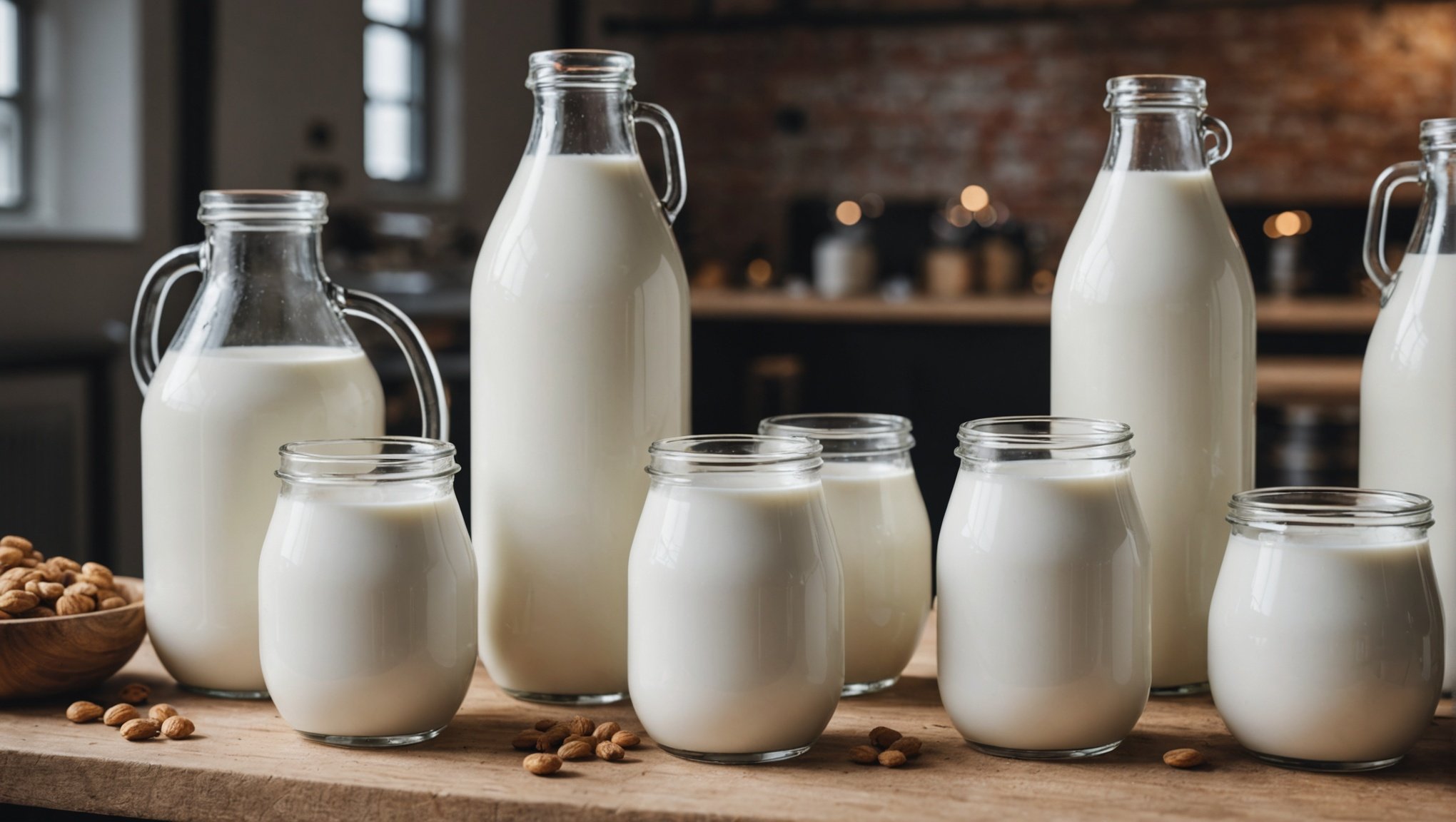The UK’s plant-based milk market is booming, presenting exciting opportunities for entrepreneurs. However, launching a production facility involves navigating a complex landscape of regulations. Compliance is essential not only for legal operation but also for building consumer trust. This guide breaks down the requirements you need to know, from food safety to labeling standards. Equip yourself with the knowledge to launch your plant-based milk venture successfully and sustainably.
Overview of UK Regulations for Plant-Based Milk Production
Navigating the UK regulations for plant-based milk production is crucial for businesses aiming to ensure compliance and market success. The regulatory landscape is designed to maintain quality, safety, and consumer trust. Understanding these regulations helps producers align their operations with legal standards, avoiding potential pitfalls.
Topic to read : Why do engineers need to learn english
The primary governmental bodies overseeing plant-based milk production include the Food Standards Agency (FSA) and the Department for Environment, Food & Rural Affairs (DEFRA). These agencies set guidelines and standards that producers must adhere to, ensuring that products are safe for consumption and accurately labelled.
Key regulations focus on aspects such as food safety, nutritional content, and labelling requirements. Compliance with these regulations is essential to avoid penalties and ensure consumer confidence. For instance, plant-based milk producers must ensure that their products do not contain harmful substances and that they meet specific nutritional standards.
Also to read : Ensuring Compliance: A Guide for UK Virtual Assistant Services on Navigating Remote Work Regulations
Additionally, labelling must be clear and not misleading, providing consumers with accurate information about the product's ingredients and nutritional value. By understanding and adhering to these UK regulations, producers can effectively navigate the market and meet consumer expectations.
Necessary Permits and Licenses
Understanding the permits and licenses required for plant-based milk production is essential for compliance and successful operation. In the UK, food production businesses must obtain specific permits to ensure their production facility meets health and safety standards. These permits often include food safety certifications and environmental health approvals, which verify that the production processes and facilities adhere to regulatory standards.
For plant-based products, the licensing processes can vary. Typically, businesses need to register with local authorities, which involves providing details about their production methods and facilities. This registration ensures that the authorities can conduct inspections and verify compliance with health regulations.
There are also regional variations in licensing requirements. Different regions may have specific rules regarding the sourcing of ingredients, waste management, and transportation of goods. Therefore, it is crucial for producers to research and understand the local regulations that apply to their area.
In summary, obtaining the necessary permits and licenses is a critical step in establishing a compliant and successful plant-based milk production business. By ensuring all legal requirements are met, producers can confidently operate within the regulatory framework and focus on delivering quality products to consumers.
Safety Standards in Food Production
Ensuring food safety in plant-based milk production is paramount. The UK enforces stringent safety standards to protect consumers and maintain product integrity. These standards are part of the broader production guidelines that producers must follow.
One crucial framework in this context is the Hazard Analysis and Critical Control Points (HACCP). This system identifies potential hazards in the production process and establishes critical control points to mitigate risks. By implementing HACCP, producers can systematically manage food safety, ensuring that plant-based milk products are safe for consumption.
The Food Standards Agency (FSA) plays a pivotal role in enforcing these safety standards. The FSA provides detailed guidelines on maintaining hygiene and preventing contamination in food production. Compliance with FSA guidelines ensures that plant-based milk products meet the necessary safety criteria.
Producers must regularly assess their production processes, identify potential hazards, and implement controls to prevent contamination. This proactive approach not only safeguards consumer health but also helps producers avoid legal issues and maintain market reputation. Understanding and adhering to these food safety regulations is essential for any plant-based milk producer aiming to succeed in the UK market.
Labeling Laws for Plant-Based Milk Products
Understanding labeling laws is essential for producers of plant-based milk to ensure compliance and consumer trust. These laws require that product labels provide clear and accurate information, helping consumers make informed choices.
Requirements for Product Labeling
Labels must include essential details such as the product name, list of ingredients, and net quantity. It's crucial to ensure that the label is not misleading and accurately represents the product. This transparency is vital for maintaining consumer trust.
Nutritional Information Disclosure
Producers must adhere to specific nutritional guidelines. Labels should disclose nutritional information, including energy value, fat content, carbohydrates, proteins, and any vitamins or minerals. This information helps consumers assess the product's health benefits.
Claims and Marketing Regulations
When making claims such as "low-fat" or "high in protein," producers must ensure these are substantiated by the product's nutritional content. Misleading claims can lead to regulatory penalties and damage consumer confidence. Marketing strategies should align with legal standards to avoid potential pitfalls.
By understanding and implementing these labeling laws, producers can effectively communicate with consumers, ensuring that their plant-based milk products meet both legal requirements and consumer expectations.
Environmental Considerations in Production
Understanding environmental regulations is vital for plant-based milk producers aiming to implement sustainable and eco-friendly practices. These regulations guide producers in minimizing their environmental footprint while maintaining compliance.
Overview of Environmental Regulations
Producers must adhere to specific environmental regulations that govern waste management, energy use, and emissions. These rules ensure that production processes do not harm the environment, promoting sustainable operations. Compliance with these regulations helps producers avoid penalties and enhances their reputation as eco-conscious businesses.
Sustainable Sourcing and Production Practices
Sustainable sourcing involves selecting ingredients that are grown and harvested with minimal environmental impact. This includes using organic farming methods and reducing water usage. In production, eco-friendly practices might involve utilizing renewable energy sources and recycling materials. These steps not only support environmental health but also appeal to environmentally-conscious consumers.
Impact Assessments and Compliance
Conducting environmental impact assessments is crucial for identifying potential ecological risks associated with production. These assessments help producers implement strategies to mitigate negative impacts. Compliance with environmental regulations is monitored through regular audits and assessments, ensuring ongoing commitment to sustainability.
By integrating these eco-friendly practices, producers can contribute positively to the environment while aligning with consumer expectations for sustainable products.
Funding and Financial Assistance
Navigating the landscape of funding and financial support is crucial for startups in the plant-based milk industry. Several options are available to help businesses secure the necessary resources for growth and innovation.
Overview of Available Funding Options
Startups can explore various funding avenues, including government grants, venture capital, and private investments. Each option has its own set of criteria and benefits, catering to different business needs. Understanding these options allows producers to make informed decisions about which funding route aligns best with their goals.
Government Grants and Incentives
The UK government offers a range of grants and incentives to support sustainable and innovative food production. These grants often focus on promoting environmentally friendly practices and technological advancements. By applying for these funds, startups can reduce initial costs and foster growth.
Partnerships with Financial Institutions
Collaborating with banks and other financial institutions can provide additional financial support through loans and investment opportunities. These partnerships can offer tailored financial solutions, helping startups manage cash flow and expand operations. Establishing strong relationships with financial partners is essential for long-term success.
By exploring these funding options, startups can secure the financial backing needed to thrive in the competitive plant-based milk market.
Step-by-Step Guide to Setting Up Your Facility
Establishing a production facility for plant-based milk requires careful planning and execution. This setup guide will walk you through the essential steps to ensure a smooth facility establishment.
Initial Steps for Establishing a Production Facility
Begin by selecting a suitable location that complies with local zoning laws and has access to necessary utilities. Secure permits and licenses early in the process to avoid delays. Design your facility layout to optimise the production process, considering workflow and equipment placement.
Important Timelines and Milestones
Set realistic timelines for each phase of the project. Key milestones include completing construction, installing equipment, and conducting initial safety inspections. Allocate time for staff training and trial runs to ensure everything operates smoothly before full-scale production begins.
Best Practices for Operational Efficiency
Implement best practices to enhance operational efficiency. These include:
- Automation: Invest in automated systems to streamline the production process.
- Quality Control: Establish robust quality control measures to maintain product consistency.
- Sustainability: Incorporate eco-friendly practices to reduce environmental impact.
By following this setup guide, you can efficiently establish a production facility that meets regulatory standards and supports sustainable operations.
Resources for Further Assistance
Navigating the complexities of plant-based milk production can be challenging. Fortunately, numerous resources and support networks are available to assist producers in understanding regulations and enhancing their operations.
Key Resources for Navigating Regulations
Producers can access comprehensive resources from industry organizations such as the Food Standards Agency (FSA) and the Department for Environment, Food & Rural Affairs (DEFRA). These bodies offer detailed guidelines and updates on regulatory changes, helping businesses stay compliant.
Support Organizations and Industry Groups
Joining industry organizations like the Plant-Based Foods Association provides networking opportunities and access to expert advice. These groups often host workshops and seminars, offering valuable insights into best practices and regulatory compliance. Engaging with these organizations can enhance understanding and foster collaboration among producers.
Online Platforms for Information Sharing
Online platforms like industry forums and social media groups serve as excellent tools for information exchange. Producers can share experiences, seek advice, and stay informed about the latest industry trends. These platforms facilitate peer support, allowing producers to learn from each other's successes and challenges.
By leveraging these resources and networks, plant-based milk producers can navigate the regulatory landscape more effectively and ensure their business thrives.
Case Studies and Practical Tips
Exploring case studies provides valuable insights into successful plant-based milk production. These real-world examples illustrate how industry leaders navigate challenges and achieve operational excellence.
Real-World Examples
One notable example is Oatly, which revolutionised the market with its innovative oat milk products. By focusing on sustainability and consumer education, Oatly has become a leader in the industry. Another example is Alpro, which has successfully expanded its product range while maintaining a commitment to eco-friendly practices.
Lessons Learned from Industry Leaders
Industry leaders emphasise the importance of continuous innovation and adaptability. They highlight the need to invest in research and development to create unique, high-quality products. Additionally, maintaining transparency with consumers about sourcing and production processes builds trust and brand loyalty.
Practical Tips for Overcoming Challenges
- Optimise Supply Chains: Efficient supply chain management reduces costs and improves product availability.
- Invest in Technology: Advanced technology enhances production efficiency and product quality.
- Focus on Sustainability: Implementing sustainable practices attracts environmentally-conscious consumers and reduces environmental impact.
By analysing these case studies and applying practical tips, producers can overcome common challenges and enhance their plant-based milk operations.











